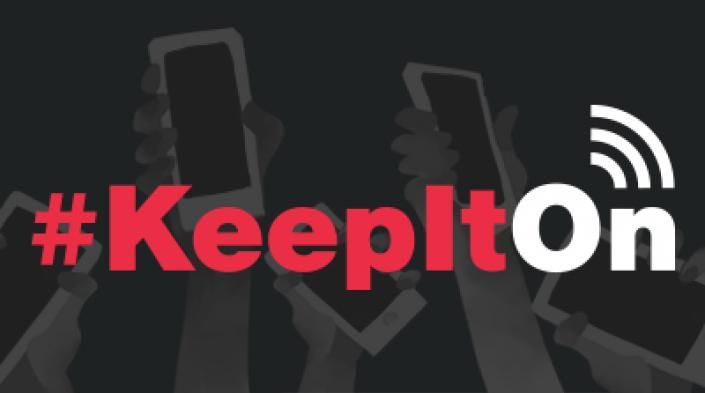
Actualizado por última vez en
Re: Internet shutdown in Zimbabwe
Your Excellency Minister Kazembe Kazembe, Minister of Information and Communication Technology and Cyber Security
We are writing to urgently request that you ensure the stability and openness of the internet in Zimbabwe. We have received reports that your government has shut down the internet. On behalf of the more than 170 organizations from over 60 countries that make up the #KeepitOn Coalition, we implore you to keep the internet on.
Internet shutdowns harm human rights and economies
Research shows that internet shutdowns and violence go hand in hand. [1], [2] Shutdowns disrupt the free flow of information and create a cover of darkness that shields human rights abuses from public scrutiny. Journalists and media workers cannot contact sources, gather information, or file stories without digital communications tools.[3] Justified for various reasons, shutdowns cut off access to vital information, e-commerce, and emergency services, plunging whole communities into fear. Disruptions also destabilize the internet’s power to support small business livelihoods and to drive economic development. A 2016 study by the Brookings Institution, a prominent think tank, revealed that shutdowns drained $2.4 billion from the global economy between 2015 and 2016. [4]
The open internet has fostered unprecedented creativity, innovation, and access to information and to other kinds of social, economic, cultural, and political opportunities across the globe. The technical means used to block access to information online often dangerously undermine the stability and resiliency of the internet. Internet shutdowns must never be allowed to become the new normal.
The current economic crisis in Zimbabwe will be further exacerbated by internet shutdowns. We estimate the shutdown will cost your country $5,742, 421 per day in direct economic costs, and will slow the realization of economic, social and cultural rights broadly. [5]
Internet shutdowns violate international law
A growing body of findings and resolutions hold that intentional disruptions to the internet violate international law. The UN Human Rights Council and the UN General Assembly have passed, two by consensus, multiple resolutions that unambiguously condemn internet shutdowns and similar restrictions on freedom of expression online. For example, the UN Human Rights Council in Resolution A/HRC/RES/32/13:
Condemns unequivocally measures to intentionally prevent or disrupt access to or dissemination of information online in violation of international human rights law and calls on all States to refrain from and cease such measures.
Experts from the United Nations, Organization for Security and Co-operation in Europe (OSCE), Organization of American States (OAS), and the African Commission on Human and Peoples’ Rights (ACHPR), declared that internet “kill switches” can never be justified under international human rights law, even in times of conflict. [6]
In November 2016, ACHPR adopted a resolution on the right to freedom of information and expression on the internet in Africa, which noted its concern over “the emerging practice of State Parties of interrupting or limiting access to telecommunications services such as the Internet, social media and messaging services, increasingly during elections.” [ACHPR/Res. 362(LIX)]
The UN Human Rights Committee, the official interpreter of the International Covenant on Civil and Political Rights, emphasizes in General Comment no. 34 that restrictions on speech online must be strictly necessary and proportionate to achieve a legitimate purpose. [7] Shutdowns, by contrast, disproportionately impact all users, and unnecessarily restrict access to information and emergency services communications during crucial moments. Shutdowns are neither necessary to, nor effective at, achieving a legitimate aim, as they often spread confusion and encourage more people to join public demonstrations.
We respectfully call on you to:
-
Ensure that the internet, including social media, is restored
-
Publicly declare your commitment to keep the internet on, and to notify the public of any disruptions
-
Encourage telecommunications and internet services providers to respect human rights through public disclosures on policies and practices impacting users.
We are happy to assist you in any of these matters.
Sincerely,
Access Now
Association for Progressive Communications (APC)
African Freedom of Expression Exchange (AFEX)
African Bloggers and Cyber Activists for Democracy - Africtivistes
AFROTRIBUNE (Togo)
Alliance for Affordable Internet (A4AI)
Cameroon Digital Rights Coalition
Centre for Human Rights and Democracy in Africa
Collaboration on International ICT Policy for East and Southern Africa (CIPESA)
Committee to Protect Journalists
Human Rights Foundation
Internet Sans Frontières
Media Foundation for West Africa
NetBlocks
OpenNetAfrica
Paradigm Initiative
PEN America
Reporters San Frontières/ Reporters without Borders (RSF)
Right2Know Campaign
Sassoufit Collective
Small Media Exchange (SMEX)
The World Wide Web Foundation
Unwanted Witness
[1] An internet shutdown is defined as an intentional disruption of internet or electronic communications, rendering them inaccessible or effectively unusable, for a specific population or within a location, often to exert control over the flow of information. See more at https://accessnow.org/keepiton
[2] Anita R. Gohdes, ‘Pulling the Plug: Network Disruptions and Violence in the Syrian Conflict’ (Journal of Peace Research: 31 January 2014) http://www.anitagohdes.net/uploads/2/7/2/3/27235401/gohdes_synetworkaug1...
[3] Jonathan Rozen, ‘Journalists under duress: Internet shutdowns in Africa are stifling press freedom’ (Africa Portal) 17 August 2017) https://www.africaportal.org/features/journalists-under-duress-internet-...
[4] Darrell West, (Brookings Institution, October 2016) “Internet shutdowns cost countries $2.4 billion last year” https://www.brookings.edu/wp-content/uploads/2016/10/intenet-shutdowns-v...
[5] CIPESA and Netblocks, ‘Cost of Shutdowns’ https://netblocks.org/cost/
[6] Peter Micek, (Access Now, 4 May 2015) ‘Internet kill switches are a violation of human rights law, declare major UN and rights experts’ https://www.accessnow.org/blog/2015/05/04/internet-kill-switches-are-a-v...
[7] UN Human Rights Committee (UN, July 2011) “General Comment No. 34” http://www2.ohchr.org/english/bodies/hrc/docs/GC34.pdf


